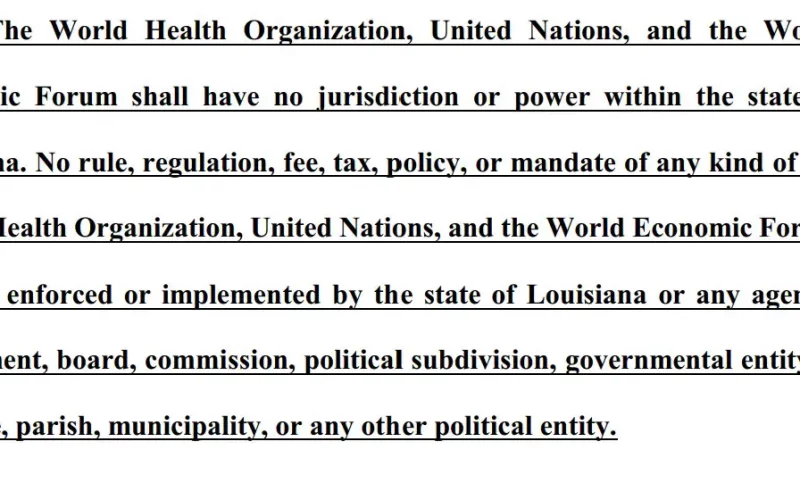The Louisiana Senate has enacted legislation that would free the state from mandates and requirements imposed by international organizations such as the World Health Organization (WHO), United Nations (UN), and World Economic Forum.
Senate Bill 133 was unanimously passed with bipartisan support to prevent international bodies from declaring jurisdiction over the state, stipulating that the three above-named organizations “shall have no jurisdiction or power within the state of Louisiana.”
The legislation prohibits these tyrannical, unelected, and undemocratic institutions from unilaterally exerting any jurisdiction or power over Louisiana citizens.
“The World Health Organization, United Nations, and the World Economic Forum shall have no jurisdiction or power within the state of Louisiana. No rule, regulation, fee, tax, policy, or mandate of any kind of the World Health Organization, United Nations, and the World Economic Forum shall be enforced or implemented by the state of Louisiana or any agency, department, board, commission, political subdivision, governmental entity of the state, parish, municipality, or any other political entity.”
Vigilant News reports the legislation is “still pending passage in Louisiana’s Republican-majority House,” however, the bill is likely to pass.
The bill comes as the WHO, UN, and WEF are working to promote a global pandemic treaty, which would give those agencies greater discretion over how nation-states react in the case of another pandemic.
Last month, a group of 23 former country presidents, 22 former prime ministers, a former UN Secretary General, and three Nobel laureates urged the global community to speed up discussions on a Pandemic Accord under the WHO’s Constitution.
SB 133 also comes as leaders advocate for more strict global policies aimed at reversing what they claim are the detrimental impacts of climate change.
According to the Congressional Research Service (CRS), whether a foreign agreement is lawful under US law is determined by a variety of variables.
Self-executing treaties have a status equal to federal statutes, superior to U.S. state laws and inferior to the Constitution. Depending on their nature, executive agreements may or may not have a status equal to a federal statute. Non-self-executing provisions in treaties and executive agreements occupy a complex place in the U.S. legal system. While non-self-executing provisions bind the United States as a matter of international law, they do not create rights or obligations enforceable as domestic law in U.S. courts.
Some legal analysts argue that the anti-commandeering doctrine, enshrined in the Tenth Amendment of the United States Constitution, states that the federal government cannot commandeer state and local resources for its own purposes; thus, neither can international bodies.
State Senator Valarie Hodges, who co-authored the law, told The Blaze that it “comes after years of attempts to secure our state sovereignty from the overreaching hands of the WHO, U.N., and WEF.”
“We have watched a horror story unfold in front of us as time has shown that the ‘recommendations’ and coercive regulations from outside organizations such as the WHO have harmed hundreds of thousands of Americans who took a vaccine that they were told was safe and effective,” said Hodges. “Now, we are witnessing severe, long-term side effects and countless deaths because the ‘experts’ were wrong.”

